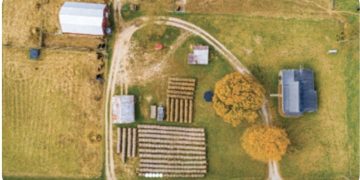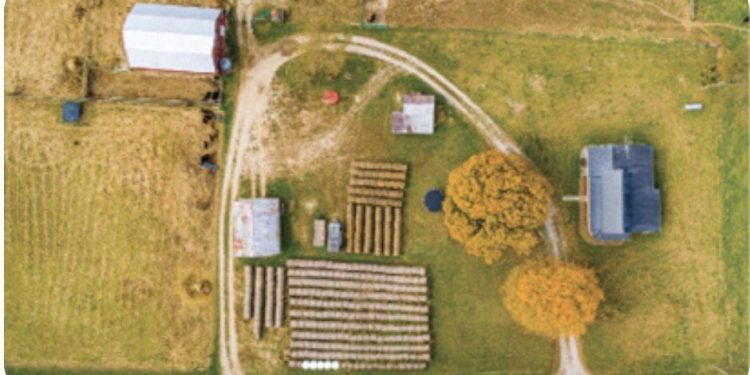Thieves are now reportedly using drones to scout farms and ranches, looking for their next big score.
“We were having a series of crimes occur, including some quads that were taken from a very remote location at a ranch,” Solano County, California, Sheriff’s Department Sgt. Jim Currie said. “We couldn’t figure out why anyone would even know they were there.”
Ultimately, investigators determined the alleged thieves had used drones, also called unmanned aerial vehicles or UAVs, to look for equipment to steal.
“What’s unique about it to us, and what caught our attention, was the use of the drones. This is all new to us, and I don’t think this is going to go away,” Currie said.
Two people were arrested last month and charged with grand theft, trespassing and burglary for allegedly stealing in excess of $100,000 in tools, farm equipment and other property from several rural locations.
Solano County cattle and sheep rancher Ryan Mahoney said his agricultural equipment, which was later recovered by law enforcement, was part of the crime spree.
“The criminals that we’re dealing with are professional petty thieves,” Mahoney said. “They have made a career out of this. They know the values of what to take and what not to take.
“I’d much rather have them just come up and ask me for a hundred bucks, rather than cause damage and create that feeling of violation,” he said.
Currie said he has heard reports that deputies in other counties are seeing more use of drones and other technology by thieves, and added that he will be discussing the issue with fellow members of the California Rural Crime Prevention Task Force.
Detective Don Stuhmer of the San Joaquin County Sheriff’s Agricultural Crimes Unit, who chairs the task force, said he is aware of animal activist groups using drones to obtain footage for their causes. He said he isn’t surprised that thieves are also employing drones.
“Use of drones would definitely be more feasible for bad guys to scout a property for items they would steal,” Stuhmer said, noting that someone can purchase a drone for as little as $35.
“Technology is definitely a venue bad guys are becoming better versed in and utilizing on a daily basis,” he said. “We are seeing the police radio scanning apps more and more on bad guys’ phones, and they are getting better at selling stolen goods on web-based platforms. We just caught a guy selling stolen tractor GPS units on eBay.”
Robert Spiegel, a policy advocate for the California Farm Bureau, said the use of drones in California “is a complicated area of law that is always developing, because it is such a new activity.”
Operation of drones is regulated by the Federal Aviation Administration. It requires, for example, that drone operators keep their crafts within their line of sight while the UAVs are airborne.
State laws that have been passed, Spiegel said, prohibit drone operators from interfering with the work of first responders and prohibit operators from recording images of personal or private activities.
He said use of drones by thieves serves as a warning to farmers and ranchers.
“The days in which we were able to leave equipment in a field in the middle of nowhere for a night are long gone,” Spiegel said. “We have to make it more difficult for the criminal elements of our society to be able to profit from our complacency.”
In Solano County, Currie said, the drone-aided thefts began in mid-February and continued until March 8, when the two suspects were arrested.
A break in the case came after thieves tripped the alarm at the city of Dixon’s wastewater treatment facility, where the suspects were apprehended.
The chief wastewater plant operator for Dixon, Sandy Jones, said responding officers found the suspects’ vehicle, stolen property—and two drones, which were confiscated from the vehicle.
Since the break-in, Jones said, plant security has been strengthened, with new locks, more security cameras and implementation of special drone-detection software.
To safeguard farm property from thieves, Currie suggested the following:
- Although farmers may use drones for agricultural purposes, if you start seeing or hearing a drone over your property, report it to law enforcement. He said people launching drones may be parked on the side of the road, because they need to do so from a fairly close distance.
- As far as keeping property safe from drones, keep it out of sight whenever possible. Keep all valuable tools and equipment in a building or out of sight from the air, if possible.
- Lock farm equipment and remove keys from the ignition; keep keys in a secure location that thieves cannot access.
- Use the Owner-Applied Number program. Farmers and ranchers can have tools and equipment marked with an identification number that, when checked against a national database, will connect recovered property with the rightful owner.
- Use SmartWater, new forensic technology to assist law enforcement in recovering stolen property and catching thieves. The product is a liquid that its manufacturer says can be applied to nearly any surface and fluoresces under ultraviolet light. Anyone touching an object marked with SmartWater will pick up the chemical code – even after the liquid has dried—and will carry it on their skin and clothing. Under a UV light, the solution glows a bright yellow.
As another crime-prevention strategy, rancher Mahoney said it is important for rural residents to be visible and present in their communities.
“If you know your neighbors and communicate all the time, I think you end up preventing more problems than you realize, when you’re all aware and talking,” he said.
– Christine Souza, California Farm Bureau































